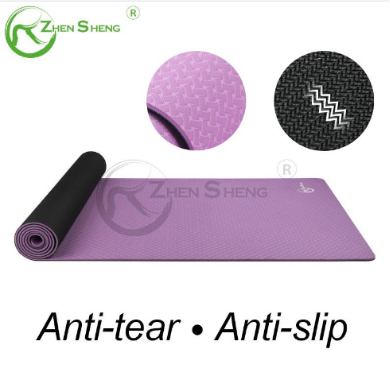Why Choose TPE Yoga Mats
If you have any product customization needs or ideas, MOQ 500, contact us.
Jun. 02, 2023

In recent years, TPE has made its debut in yoga mats to replace PVC. PVC was the go-to material for its lightweight nature, low costs and padding/cushioning; but is being replaced because of harmful additives. The transition from PVC to TPE continues to reduce negative environmental impact. There are now TPEs available developed with recycled and renewable sources, making TPEs an excellent option for those looking for more sustainable alternatives to traditional rubber or PVC yoga mats. And because TPE is free of BPA, phthalates, and common allergens, it a safe material choice not only for skin contact but for the environment, as well.
PVC yoga mat: Common, but harmful. Non-recyclable, emits toxins, and contains phthalates. Not recommended for enclosed spaces or hot yoga.
TPE yoga mat: Thermoplastic elastomer, recyclable and biodegradable. No latex, PVC, or toxins. Resistant to fluid absorption and easier to clean.
PER yoga mat: PVC without phthalates, recyclable, and produces fewer toxins when incinerated. PVC should generally be avoided.
Rubber yoga mat: Natural, expensive, but not always ecologically sustainable. Can cause deforestation. Non-toxic and provides good grip.
Jute Fiber yoga mat: Blend of natural rubber and jute. Not suitable for latex allergies. Biodegradable and offers good grip, but can feel scratchy.
Consider preferences, environmental impact, and sensitivities when choosing a yoga mat.
Sustainability of yoga mats has become one of the most important features a yogi looks for when making a purchase. One of the materials most touted as an eco-friendly option is TPE.
TPE, or Thermoplastic Elastomer, is a broad category of materials that encompasses various combinations of synthetic plastics and petrochemicals. It is not a single specific material, but rather a copolymer composed of polymers, including one hard plastic and one rubber-elastic component. This makes it challenging to pinpoint the exact composition of the TPE used in a specific yoga mat.
There are three main types of TPE available on the market, which can be classified as follows:
1. Block Copolymers: This category includes TPEs such as styrenics, capolyesters, polyurethanes, and polyamides. These TPEs are composed of blocks of different polymers that provide a balance of hardness and elasticity.
2. Thermoplastic Blends and Alloys: TPEs in this class include thermoplastic polyolefins and thermoplastic vulcanizations. They are blends or alloys of different thermoplastic materials, combining their properties to achieve desired characteristics.
3. New TPE Varieties: This category encompasses emerging types of TPEs, including metallocene-catalyzed polyolefin plastomers and elastomers, as well as reactor-produced thermoplastic elastomers. These newer TPEs offer unique properties and performance capabilities.
Each type of TPE has its own specific composition and characteristics, allowing for a range of applications and customization in various industries.
TPE Yoga Mats:
TPE is biodegradable, recyclable, and eco-friendly.
It’s free from harmful chemicals like phthalates, latex, and BPA.
TPE mats are a great choice for those with allergies or sensitivities.
Natural rubber yoga mats: These mats are made from sustainably harvested rubber, offering excellent grip, cushioning, and durability. However, they may not be suitable for individuals with latex allergies.
Cork yoga mats: Made from the bark of cork oak trees, these mats are sustainable, naturally antimicrobial, and provide great grip. While they can be more expensive than TPE or PVC mats, they offer unique benefits and are considered environmentally friendly.
Jute yoga mats: These mats are crafted from natural jute fibers, providing a rough, textured surface for enhanced grip. Jute mats are eco-friendly and biodegradable, although they may not offer the same level of comfort and cushioning as TPE or PVC mats.
These alternatives provide options for yogis seeking more sustainable choices that align with their environmental values.
Previous: Is your yoga mat safe?
Search Blog
New Products
E-mail: planning@shzhensheng.com
Mob.: +86 138 0168 6978
Tel.: +86 21 5204 8758
Add.: Room 203, Building 1, No. 423 Wuning Road, Putuo district, Shanghai 200063, China
Navigation
Get in touch
seoKeywords: custom size yoga mat custom logo yoga mat custom Rubber Pilates Yoga Mat eco friendly rubber yoga mat custom Pilates Yoga Mat TPE Rubber Professional Yoga Mat rectangle yoga mat tpe comfortable tpe yoga mat comfortable tpe yoga mat Customize nbr yoga mat custom round yoga mat round yoga mats wholesale eco friendly yoga mats wholesale non slip yoga mat wholesale Customize non slip yoga mat wholesale ankle weights wholesale custom round yoga mat round yoga mats wholesale personalized soccer ball size 5 personalized soccer ball size 4 Thermo Bonded Football Machine Stitched Football custom resistance bands wholesale wholesale resistance bands with logo custom printed resistance bands custom logo resistance bands custom size resistance bands custom length resistance bands custom ankle weights ankle weights cost ankle weights cost buy ankle weights custom balance board surf balance board oem yoga mat yoga mat factory yoga mat manufacturer tpe yoga mat manufacturer private label yoga mats